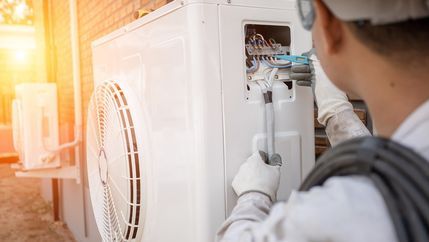
Acknowledging that the cost-of-living crisis makes the requirements challenging, the consultation overview states that the measures are designed to be affordable, fair, and feasible, and provide exemptions where needed.
The proposals to the target of a ban on fossil fuel heating from 2025 include:
- Requiring people who buy a home or business premises to switch from polluting heating systems within a fixed period after completion of the sale
- Introducing a new law that will require homeowners to make sure that their homes meet a reasonable minimum energy efficiency standard (MEES) by 2033
- Requiring private landlords to meet the same reasonable MEES by 2028
Stop new fossil fuel systems being used
Firstly, to effectively track, monitor and communicate progress we recommend setting more milestone targets leading up to 2045. One of these should be to end the use of polluting heating systems in newly built properties to reduce the number of buildings that need retrofitting closer to the target date.
Give landlords more time
The UK Government recently scrapped their target for new tenancies in England and Wales to meet EPC C by 2025 and existing tenancies by 2028, citing the financial challenges being faced by landlords. Scottish landlords are not immune to increased mortgage and building costs and are likely to experience greater financial challenges because of previous rent control measures.
Therefore, whilst we support MEES for the PRS we believe more time will be needed, and urge the Scottish Government to engage with landlords and agents to find a balance that is fair and achievable.
Recognise diversity in owner-occupied homes
The Scottish Government is not considering MEES for non-domestic properties due to their different sizes and construction methods and, while we agree with this approach, owner-occupied homes have similar challenges due to the diversity of stock and construction dates.
Homeowners will need support to select appropriate energy upgrades, for example, recommendations on measures and local suppliers, and exemptions should be available for heritage properties and those in conservation areas.
A profound impact on home buying and selling
Tight deadlines for removing polluting heating systems from a property after purchase could lead to buyers having difficulty securing a mortgage, especially with the challenge of funding improvement works on top of the costs associated with moving home.
The Scottish Government acknowledges that first-time buyers and those that move more than once before 2045 are likely to be negatively impacted by the proposal. We are concerned that additional borrowing costs are unlikely to support more first-time buyers to step onto the housing ladder and as a result, they should be exempt from these proposals and incentivised to make improvements once they have purchased a property.
We recommend the grace period after a purchase should be at least five years, and we look forward to further understanding of how the Scottish Government will work with estate agents to ensure proposed works run smoothly alongside their current processes and to make sure that purchasers, and those providing them with legal services, are clear about their role and responsibilities.
Unique challenges for remote communities
Propertymark welcomes the proposal to provide additional time to those using bioenergy, and we strongly recommend the Scottish Government also give additional time to those homes and businesses where there are no alternative clean heating systems available . It might also be appropriate to give exemptions to those areas that continue to struggle to find alternative solutions.
Scotland’s island and rural communities have an additional challenge in the safe storage and security of energy. We welcome the intention to allow polluting systems as a backup, however, greater consideration must be given to improving energy security and storage for Scotland’s most remote locations and improving local energy infrastructure to reduce the reliance on fossil fuels as a backup.









